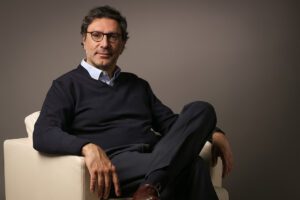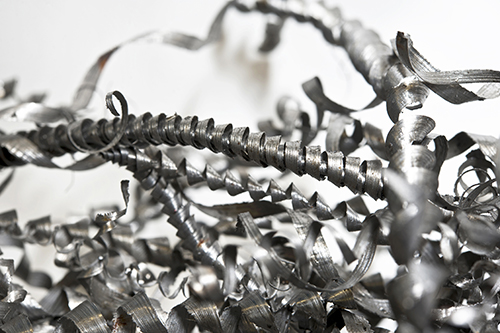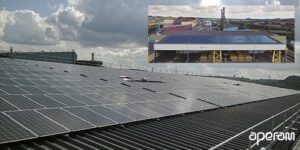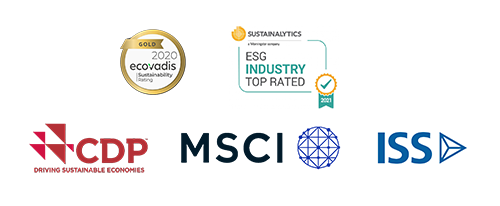Since its spin-off from ArcelorMittal 10 years ago, Aperam has become an undisputable global leader in stainless, electrical, and speciality steel, with customers in over 40 countries. Having a flat stainless and electrical steel capacity of 2.5 million tonnes in Brazil and Europe, it is also a leader in high-value speciality products.

In addition to its industrial network, which is spread over six key production facilities located in Brazil, Belgium and France, it has a highly integrated distribution, processing, and services network and a unique capability to produce stainless and speciality steels from low-cost biomass. Aperam is also widely recognised as a world leader in Sustainable Development, also referred to as Environment – Social – Governance, or ESG. We talked to company CEO Tim di Maulo to learn more about Aperam’s recent exciting and unique developments.
Aperam has long been an industry leader in embracing sustainable development and the ESG principles. In fact, these factors are at the very heart of the company’s strategy. “Our mission is to provide steel and alloy solutions that are affordable, long-lasting, and that offers the strength, versatility, and endless recyclability needed to build a sustainable society,” says company CEO Tim di Maulo. “But we also have the ambition to do this both sustainably and safely.”
To achieve these goals, Aperam employs a strategy of product and cost excellence whilst at the same time positioning itself as a leader in environmental stewardship, safety – including the Health and well-being of its employees – and responsible governance.
Environmental Stewardship
Aperam champions the responsible use and protection of the natural environment by adopting a range of sustainable practices. “We work with a product that is, by its very nature, sustainable,” says di Maulo. “That’s because stainless steel is long-lasting and infinitely recyclable.” To illustrate, di Maulo notes that the company stands out in the fact that its European production processes use about 90% scrap metal. Aperam is also unique in that it produces charcoal from its own FSC®-certified forestry in Brazil (BioEnergia), which is used in the steel-making process as a natural and renewable substitute for fossil fuels (coke).
In addition to its ongoing climate change related efforts, including reducing its carbon emissions and becoming a carbon neutral company, Aperam is also making moves to increase its use of renewable energy. For example, after installing windmills at its Genk facility (2017) and photovoltaic panels at the Châtelet facility (2018), the Isbergues and Genk sites are now moving towards solar energy.
According to di Maulo, the Genk installation is particularly impressive as it anticipates an annual energy production of 20,300 MWh. “This means that every year, we will avoid emitting 7,300 tons of CO2,” he explains. “This is equal to the annual emissions of 5,900 average households and/or what can be absorbed by 720 hectares of forest.”
Once operational, by the end of 2021, the photovoltaic installation will be the second biggest in Belgium, with the Genk plant consuming at least 97% of the generated power. The company also installed a new rolling line at Genk which, since going online in March 2021, has already cut its energy consumption by a third.
“Thanks to efforts like these, which go above and beyond what is required, Aperam’s CO2 footprint ranks as one of the best in our sector* and our overall ESG performance consistently receives top ratings from external analysts,” adds di Maulo.
Additionally, Aperam uses an internal price for CO2. Since 2016, all of Aperam’s investment assessments include the financial impact of its carbon footprint, either as a bonus or a penalty. The latest value is €60/tonne.
“This is a powerful incentive for low-carbon projects, though other environmental and social aspects are also systematically assessed,” notes di Maulo.
Lastly, in May 2021, Aperam announced its acquisition of ELG, a German-based company that is a world leader in the recycling of stainless steel and alloys. Once the necessary regulatory approvals are finalised, most likely in the second half of 2021, this acquisition will help place Aperam at the forefront of the circular economy.
* Scope 1+2. Scope 1 covers direct emissions from owned or controlled sources. Scope 2 covers indirect emissions from the generation of purchased electricity, steam, heating and cooling consumed by the reporting company.


Social Components of Aperam’s Strategy
As with environmental sustainability, Aperam adheres to strict guidelines when it comes to the social components of its strategies. “Our particularly strong emphasis on the Health and Safety of our people, promoting diversity, supporting the communities we work in, and upholding a zero-tolerance policy on ethical issues, results in exceptional team cohesion and excellent risk prevention,” says di Maulo.

It’s because of this deeply embedded Health and Safety culture that the company was able to take immediate and swift actions at all its plants and offices during the COVID-19 pandemic, guaranteeing a safe workplace for its employees. In addition to its constant attention to Health and Safety, Aperam is also committed to creating a working environment that encourages its employees to thrive. To achieve this, the company regularly engages with employees to find the right type of personalised training, mode of operation, and opportunities for professional development. For example, the company has developed an onboarding e-learning module for its new white-collar employees.
The program covers the major topics related to Health & Safety, the Environment, Ethics & Compliance, Information Technology, Career (Performance and Competencies), and Management. It includes a course dedicated to the basics of the stainlesssteel process. The platform is also used to design and manage content, record progress, communicate about opportunities for online training, and support online knowledge sharing.

The company also works to ensure that all employees receive clear goals, which is done via its global Information Technology platform (My HR) and/or via local processes and tools. “The goal of these initiatives is to not only keep our employees highly motivated and performing well, but also to nurture a sense of being a part of the Aperam family,” adds di Maulo. “Ultimately, we want to create an atmosphere conducive to helping our employees develop groundbreaking ideas that will preserve our market position.”
Aperam is committed to promoting diversity, a commitment exemplified in the company’s annual ‘Embracing Diversity – with a Woman’s Touch’ initiative. Inspired by the United Nations and launched in 2018, the program aims to increase female representation at all levels of the Aperam community and to ensure that their work environment allows them to thrive and demonstrate the very best of their talents.
Governance
When it comes to governance, Aperam believes that achieving best practices and applying the strongest business ethics are the keys to building trust with its customers, employees and the communities it works in. “In doing so, we protect our market position and license to operate, and ensure our ability to thrive,” says di Maulo. “Our strong customer focus, with innovation and R&D being key pillars, is a testament to the fact that we are good at listening and are able to find the right solutions for our customers – a pattern we repeat in our social dialogues and stakeholder engagement.”

This approach seems to be working. Ten years ago, Aperam had a net financial debt of €679 million. Today, it has achieved a strong financial position with a net financial debt of €1 million. Furthermore, while many European countries and industries remained shut down due to the COVID-19 pandemic, Aperam’s plants were open, fully operational and continuing to serve its customers by the second quarter of 2020. That’s because the company was able to quickly align its production with both the lower level of demand and changing safety protocols, leverage national unemployment schemes in order to adapt its cost base with minimal impact on its people, and reduce all non-essential capital expenditures.
“All of these actions built on Aperam’s ongoing efforts to improve our structural cost competitiveness and internal operational excellence plan,” notes di Maulo. While Aperam is in a much stronger position than at its creation in 2011 and capable of delivering value in the most challenging market conditions, the ambition is to continue to strengthen Aperam. Thanks to a combination of cost reductions, growth and mix improvements under Phase 4 of our Leadership Journey®, Aperam is adapting its footprint to defend its cost leadership in Europe by targeting volumes and expertise at the most efficient lines. This will form a solid basis for the second stage where the resulting increase in productivity will be used for mix improvement and growth measures. As a reminder Aperam targets €150 million of gains over the period 2021 to 2023 under this Phase; and has already reached cumulative gains of €22 million at the end of June 2021. While executing the detailed Phase 4 of the Leadership Journey®, Aperam is already working on further improvement measures post 2023.
A Catalyst for Responsible Change
Knowing that it is not enough to simply focus on its own sustainability, Aperam has also committed itself to help establish standards for the entire industry. As such, in 2019, Aperam became the first stainless steel company to join ResponsibleSteel™, the industry’s first global multistakeholder certification program aimed at maximising steel’s contribution to a sustainable society. To achieve this, the organisation promotes cooperation and mutual commitment by companies at all levels of the steel supply chain, representatives from civil society, and other stakeholders.
But Aperam doesn’t just talk the talk, it walks the walk too. “I’m happy to report that we are well on our way to becoming one of the first ResponsibleSteel™ certified companies,” says di Maulo. “This independent label will recognise our commitment to sustainability and will give our customers confidence that the stainless steel they purchase has been produced in accordance with the best ESG practices.”
 Aperam also supports new regulations aimed at supporting world-wide sustainability. For example, the European Union is considering establishing a carbon border that, if implemented, will stop potential polluting importers from replacing responsibly-produced materials with high-emission products.
Aperam also supports new regulations aimed at supporting world-wide sustainability. For example, the European Union is considering establishing a carbon border that, if implemented, will stop potential polluting importers from replacing responsibly-produced materials with high-emission products.
In parallel, local legislation is already encouraging investments in low-carbon or transition-enabling sectors. Whilst some of its customers do not yet fully recognise the value of sustainability, things are definitely beginning to change. “As many of our customers’ own customers begin to request sustainable, environmentally-friendly products, we are seeing a shift in favour of the sustainably sourced and produced solutions that Aperam offers,” remarks di Maulo.
To support this shift, Aperam constantly highlights how its materials are sustainably made, how its products and wastes are recycled, and how its production processes increasingly rely on renewable energies. In addition to a sustainable production process, the company also offers customers a portfolio of sustainable solutions, including products for renewable energy systems, electric vehicles, more efficient home appliances, and safe water treatment – all of which help move society towards a more responsible world.
Conclusions
All in all, the future looks bright for Aperam. As it uses its social, environmental, and governance responsibilities to drive its sustainability commitments, it will continue to be a leading light and a force to be reckoned with.

Every week we share a new Featured Story with our Stainless Steel community. Join us and let’s share your Featured Story on Stainless Steel World online and in print.
All images were taken before the COVID-19 pandemic, or in compliance with social distancing.


